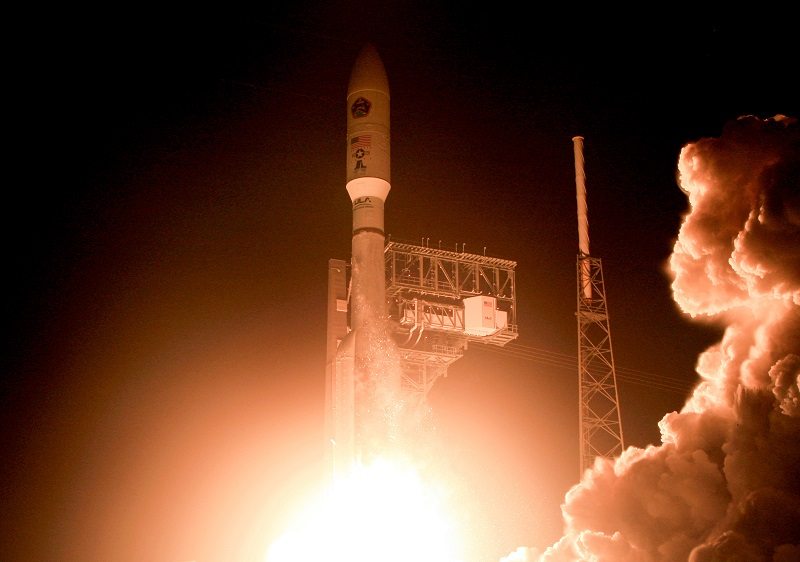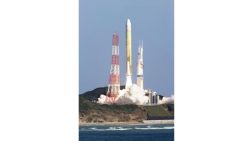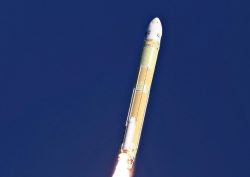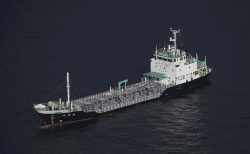
A United Launch Alliance Atlas 5 rocket lifts off from the Cape Canaveral Air Force Station, Fla., on Aug. 8, 2019.
16:42 JST, August 18, 2022
WASHINGTON (Reuters) — With Earth’s orbit growing more crowded with satellites, a U.S. government agency on Aug. 5 said it would begin revising decades-old rules on getting rid of space junk and on other issues such as satellite refueling and inspecting and repairing in-orbit spacecraft.
“We believe the new space age needs new rules,” Federal Communications Commission (FCC) Chairwoman Jessica Rosenworcel said after the 4-0 FCC vote, adding that current rules “were largely built for another era.”
She said the FCC needs “to make sure our rules are prepared for the proliferation of satellites in orbit and new activities in our higher altitudes.”
The FCC also plans to look at “new ways to clean up orbital debris. After all, there are thousands of metric tons of junk in space,” Rosenworcel added. The FCC will look at “the potential for orbital debris remediation and removal functions that offer the prospect of improvement in the orbital debris environment.”
The FCC is asking questions about in-space servicing, assembly, and manufacturing (ISAM), which includes things like “repairing and refueling satellites and even assembling whole new systems in orbit,” Rosenworcel said.
The proceeding will look at efforts to transform materials through manufacturing while in space and ISAM spectrum needs.
“The FCC remains the only agency to license virtually every commercial space mission that touches the United States,” FCC Commissioner Geoffrey Starks said. “With that power comes the responsibility to understand the missions we authorize, and to create an enabling regulatory environment that opens new doors while still protecting against new risks.”
Starks said the proceeding “will help us build the record we need to fully understand emerging ISAM technologies, their spectrum requirements [and] their debris implications.”
The FCC said ISAM has “the potential to build entire industries, create new jobs, mitigate climate change, and advance America’s economic, scientific, technological, and national security interests.”
The FCC is already moving to update its satellite rules and previously adopted new rules to help satellite launch companies get access to spectrum for transmissions “from space launch vehicles during pre-launch testing and space launch operations.”
The FCC in November granted an experimental license to NanoRacks LLC for communications with an experimental component attached to the second stage of a SpaceX Falcon 9 launch vehicle “to demonstrate metal-cutting in space.”
The FCC said the proceeding will determine what role if any it should play in reviewing “planetary protection plans and implications” for missions.
Top Articles in Science & Nature
-

Japan Institute to Use Domestic Commercial Optical Lattice Clock to Set Japan Standard Time
-

Space Mission Demonstrates Importance of International Cooperation, Astronaut Kimiya Yui Says
-

Japan to Face Shortfall of 3.39 Million Workers in AI, Robotics in 2040; Clerical Workers Seen to Be in Surplus
-

Record 700 Startups to Gather at SusHi Tech Tokyo in April; Event Will Center on Themes Like Artificial Intelligence and Robotics
JN ACCESS RANKING
-

Japan Institute to Use Domestic Commercial Optical Lattice Clock to Set Japan Standard Time
-

Israeli Ambassador to Japan Speaks about Japan’s Role in the Reconstruction of Gaza
-

Man Infected with Measles May Have Come in Contact with Many People in Tokyo, Went to Store, Restaurant Around When Symptoms Emerged
-

Prudential Life Insurance Plans to Fully Compensate for Damages Caused by Fraudulent Actions Without Waiting for Third-Party Committee Review
-

Woman with Measles Visited Hospital in Tokyo Multiple Times Before Being Diagnosed with Disease























